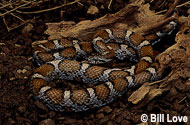Description:
Certainly a pretty snake, of the many subspecies of milk snake, the eastern is the least favored by hobbyists. It has a reputation, perhaps deserved, of being a bit difficult to acclimate. The olive red, bright red, or maroon blotches are edged narrowly in black and contrast nicely with the gray ground color. If frightened the milk snake will flatten its head a bit and strike repeatedly. One eastern milk snake, or a pair (if they’re compatible—remember all of the kingsnakes and milksnakes are cannibalistic at times) may be maintained in a 20 to 30 gallon capacity terrarium. The substrate for this secretive snake may be of folded newspaper, several thicknesses of paper towels, aspen shavings or cypress shavings, or pelleted newspapers. Hiding areas in the form of small hollow logs and a plastic hide box should be provided. A water bowl sufficiently large for the snakes to both drink and soak should be provided. The water must be kept fresh and clean. Daytime illumination is provided and a small undertank heater maintains a suitable temperature gradient. The temperature on the hot end of the terrarium should be about 82 degrees Fahrenheit; the cool end should be in the 70s. Nighttime temperatures can drop into the high 60s. If kept merely as a pet, the eastern milk snake can be kept warm all winter long and it will usually continue to eat. However, if they cease feeding during the cooler winter months it would be best to cool them to 52 to 56 degrees for a 90 day period of dormancy, lest they expend body reserves unnecessarily. If you intend to breed these snakes, they will probably require the 90 day period of dormancy anyway. Most eastern milksnakes will accept small mice as their preferred prey. Eastern milk snakes usually have from 4 to 10 eggs, but occasional clutches of up to 16 eggs have been documented. The hatchlings vary between 6½ and 11 inches in length.
Habitat:
A habitat generalist, this milk snake is found in woodlands, meadows, pastures, at the edges of water courses, amidst talus, under artificial cover, and in many other habitats.
Range:
This is the northeasternmost of the milk snake clan. It is found from southeastern Maine and southern Quebec to southern Minnesota, eastern Kentucky and western North Carolina.
Scientific Name: Lampropeltis triangulum triangulum
Species Group: milk-snake
Family: Colubridae
Size: Most adults are 36 inches or slightly less in length. The record size is 52 inches.
Level: beginner
Weight: 1-to-3-lbs
Dangerous: No



